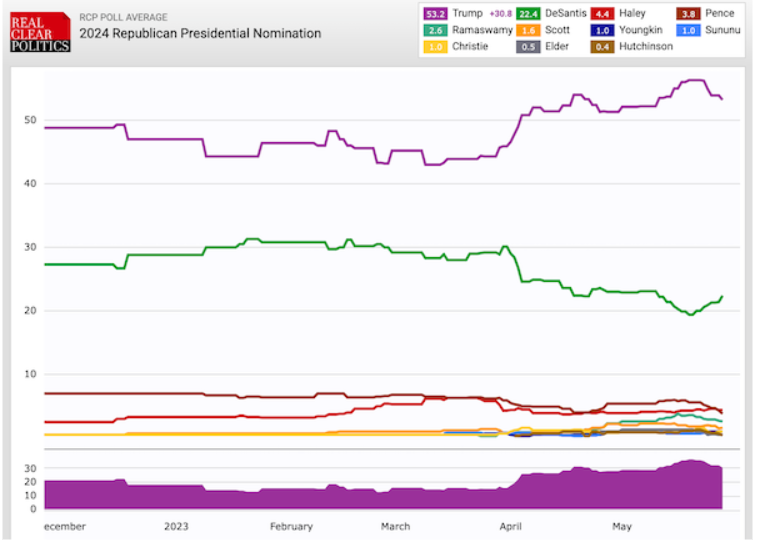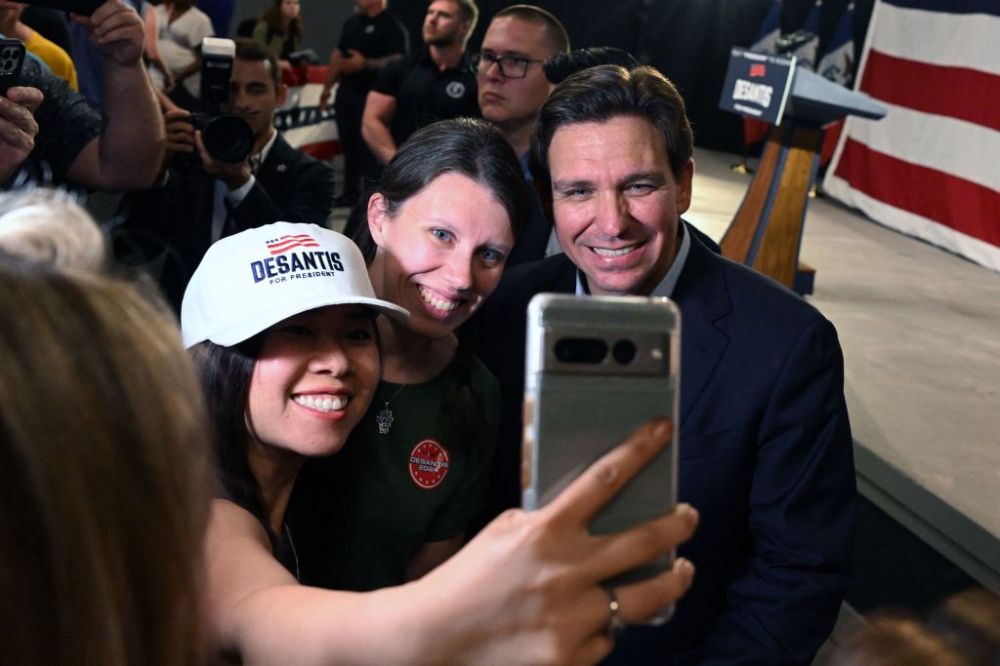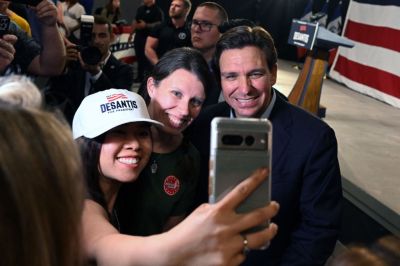How much of your soul are you willing to sell to end Donald Trump’s political career?
I’m willing to sell quite a lot of mine. I’ve committed to supporting this sorry post-liberal droog in the Republican primary, haven’t I?
No one is willing to sell more of his soul to defeat Trump than Ron DeSantis.
Yesterday the former president was confronted by a voter in Iowa with the allegation that "we have lost people because you supported the jab,” reflecting the conventional wisdom among many populists that the COVID vaccines funded by Trump’s administration did more harm than good. Trump could have and should have responded by pointing to the scoreboard, but that wouldn’t have made him any friends in a Republican primary. So he gave the prudent answer, noting that opinion is divided on the vaccines and that he opposes mandates, at least.
What he said was less interesting than the fact that Team DeSantis circulated the clip online as if it were some sort of damaging Trump gaffe.
“Praising the COVID mRNA shots” is very much a liability in a party where anti-vaxxism has begun to spill over from skepticism of COVID inoculations to skepticism of childhood inoculations in general. DeSantis is willing to exploit that skepticism despite all the consequences for public health that it might entail because he thinks it’ll gain him an electoral advantage.
Not just willing, I should say, but eager, as the clip above wasn’t the only one posted yesterday by his operation highlighting Trump’s tepid enthusiasm for vaccines. “I am unequivocal in believing that anyone—even DeSantis—is preferable to Trump in a GOP primary,” Sarah Longwell wrote of the governor playing footsie with cranks. “But don’t tell me Ron DeSantis is good. That these two men dominate 85% of GOP voter preferences is such an indictment of where the party is.”
I wouldn’t tell anyone that DeSantis is good. I will tell them that there’s a method to his cynical madness, in theory.
To overtake Trump the governor needs to peel off blue-collar populists, and lots of ‘em. There aren’t enough college grads left in the party to win a primary by consolidating that bloc. Unsurprisingly, voters without a college degree are considerably less likely than college grads to be vaccinated and to agree that the benefits of COVID vaccines outweigh the costs, and Team Ron knows it. And so inoculation has become part of their multi-pronged pitch to convince the non-college GOP majority that DeSantis is more in sync with them culturally than Trump is.
Look at the latest polls, though, and you’re left to wonder: In his quest to impress populists, has he begun to alienate everyone else?
Three months ago I wrote about a hard reality for DeSantis in early primary polling. He was holding his own against Trump against college grads, sometimes even leading within that group, but Trump maintained a stranglehold on voters who didn’t go to college. Reasonably enough, DeSantis went all-in on culture war during the spring Florida legislative session to try to win over that non-college cohort. Pro-gun, pro-life, anti-trans, emphatically anti-woke: If you’re a blue-collar right-winger looking for a “fighter” as president, DeSantis spent the last few months burying you in evidence that he’ll confront the left on all cultural fronts.
It hasn’t worked. Not only hasn’t it worked, DeSantis has lost ground with college-educated Republicans.
On Wednesday Morning Consult published these findings tracking the race from December of last year through May. The red line is Trump, the blue is DeSantis.

The governor has slipped within both groups but the shift among white college graduates is glaring. He remains stronger with higher-educated Republicans than with less-educated ones but his lead last winter within that bloc has become a 17-point Trump advantage.
Other polls show the same erosion, with Trump growing his margin over time within his own blue-collar base and DeSantis’ white-collar base. In March Monmouth found Trump up 54-40 among non-college Republicans in a head-to-head contest with the governor but DeSantis way ahead of Trump among college grads, 62-30. As of late May, Trump’s lead had grown within the first group to 63-29 while DeSantis’ lead had shrunk within the second to 53-39. That’s a swing of roughly 20 net points in each demographic in less than three months.
More? In February Echelon Insights found Trump leading DeSantis by 15 points in a multi-candidate field owing to the same familiar educational split. Non-college Republicans preferred Trump, 54-27, while college grads preferred DeSantis, 36-33. Three months later Trump leads in both demographics, 58-15 and 33-25, respectively. After all the culture-war fireworks in Florida this spring, the governor finds himself in a deeper hole with voters across the educational spectrum.
I suspect Team Ron believed college grads would remain in his corner no matter how hard he pandered to Trumpers, for precisely the reason Sarah Longwell gave. However much contempt you may feel for the governor, your contempt for a coup-plotter will be greater. And insofar as higher-educated Republicans might be less prone to make political choices based on tribal loyalties than calculated self-interest, DeSantis may have assumed that his vaunted electability advantage over Trump would continue to bind them to him.
In sum, he could indulge the policy whims of Trump’s voters on cultural matters without fear of his own base eroding.
Or so he thought.
On Thursday YouGov released a poll showing him losing ground since his campaign launch on May 24. Earlier this month he trailed Trump by 14 points; now he trails by 24. The familiar education gap abides, with DeSantis continuing to lead Trump among college grads and postgrads while getting obliterated among the Republican majority that lacks a college degree. Why has he slipped?
Yahoo News, which partnered with YouGov on the poll, suggests that centrist voters may have begun to pay attention to the governor’s zealousness in wooing right-wing populists and disliked what they saw. YouGov tested eight different policy proposals that DeSantis recently signed into law in Florida and found that six of them are underwater with Americans. Permitless carry polls at 22-69; banning state colleges from funding diversity initiatives at 29-55; and the new six-week abortion ban at 35-51. All of these measures are much more popular among Republicans, of course, but not wildly popular. More than a quarter of the GOP opposes the abortion and diversity bans and a majority(!) opposes permitless carry.
When YouGov informed voters that DeSantis supports all eight policies it described, the reaction was telling:
Notably, the number of independents who now said they would definitely not vote for DeSantis rose 4 points (from 34% to 38%)—while the share of potential Republican primary voters who said they definitely would vote for DeSantis dropped by six points (from 55% to 47%).
Upscale Republican professionals, having clamored for DeSantis early based on his reputation as The Chosen One sent to destroy Trump, may have taken a hard look as he geared up to run and concluded that he’s too Trumpy himself. (Some of his own donors might fall into that category, in fact.) Insofar as they’ve assumed to this point that DeSantis is considerably more electable than Trump, learning about his unpopular populist agenda might have led them to question that as well. If so, imagine the effect his anti-vax nonsense will have on them.
DeSantis’ problems raise the question of whether it’s realistically possible to build a Republican coalition capable of overcoming Trump by doing what he’s doing. He needs to excite a sizable chunk of Trump’s populist base, but to do that he needs to make moral and civic compromises that risk scaring off the rest of the party.
“Well, he should change his strategy then,” you might say. Should he?
I don’t think so.
There’s an obvious flaw in the theory that DeSantis is losing altitude because he’s too Trumpy. Namely, the voters in his column who are ditching him appear to be switching to … Trump.
If your problem with the governor is that he’s a tad too radical, the guy who tried to depose the incoming president a few years ago isn’t the obvious fallback choice. Nikki Haley is, or Tim Scott.
But Haley and Scott haven’t moved in polling since DeSants’ slide began. It’s Trump who’s ascendant.

I think the biggest cause of DeSantis’ fade and Trump’s rise is hiding in plain sight in that graph. The governor began to slip and the former guy began to climb right around March 30, the day news broke that Trump would be indicted in Manhattan.
Many a pundit at the time speculated that the indictment would produce a bounce in primary polling for the accused criminal, not unlike the FBI search of Mar-a-Lago did last summer. There’s the bounce, clear as day, in the purple and green lines as March gives way to April. There may have been some populists to that point who were leaning DeSantis because of the governor’s energetic culture-war campaign in Florida, only to abandon him and rally to Trump’s side because the “deep state” or whatever moved against him.
Perhaps that bounce will fade in time … although two months is a long time to still be bouncing. More likely, I think, is that Trump’s aggressive attacks on DeSantis helped convince those populists who shifted toward him post-indictment to remain in his camp. Do you want to spite the left by renominating the Republican they hate most, he asked them, or do you want to nominate a Paul Ryan acolyte who once supported draconian reforms to Social Security and Medicare?
Perhaps not coincidentally, DeSantis has lost more support among older Republicans over the last six months than younger ones (although he had further to fall).

If I’m right that it’s not DeSantis’ many populist panders that have hurt him so much as Trump exploiting the indictment and the governor’s establishment past, then DeSantis might as well keep pounding away at culture war. There will be many more voters who didn’t go to college in the coming Republican primary than did. A campaign heavy on cultural revanchism rather than, say, tax cuts amounts to hunting where the ducks are.
And those populist voters might be persuadable to a surprising extent. In her newsletter on Tuesday, my colleague Sarah Isgur pointed to an analysis by Patrick Ruffini of Echelon Insights suggesting that a large share of Trump’s base is open to switching to the governor. Ruffini identified a cohort he calls “ultra-concerned Republicans,” the type who are alarmed about, well, everything; they comprise nearly a third of the party and prefer Trump by a three-to-one margin, but fully 69 percent say they’re considering DeSantis.
If you’re Team Ron and you’re keen to lure those heavily engaged “ultra-concerned” voters out of Trump’s tent, what better way to do so than by showing off your abundant culture-war portfolio as proof of how “ultra-concerned” you are too? Disney, anti-vax, something something “woke,” DEI, ESG, assorted other acronyms: All of it is aimed at demonstrating that DeSantis is the tip of the right’s cultural spear, not Trump.
It’s his best play. It’s what I’d do—minus the anti-vax stuff. Unlike the governor, I’d insist on retaining a small piece of my soul.
But can it work?
The wrinkle in the idea that DeSantis might win back populists by plugging away at culture war is that it wasn’t just non-college Republicans who shifted toward Trump after he was indicted. The first graph above demonstrates that Republican college grads did too. It’s comforting to believe that more educated right-wingers are immune from the tribalist instincts that bind blue-collar voters so tightly to Trump but it’s obviously not true. The “deep state” blather works on plenty of people with bachelor’s degrees too.
Which leaves us to despair: Realistically, is there a way DeSantis can claw back the voters he’s lost to Trump since March or has this cake essentially already been baked by tribalism?
There are less realistic ways he might do it. If Trump had to bow out of the race for unexpected reasons, the governor is positioned to inherit most of his voters. If Trump is slapped with another indictment or six, maybe some of his supporters will begin to worry about electability—although it’s not what you’d predict based on the polling above. Even if no events intervene to complicate Trump’s campaign, DeSantis may find more college graduates gravitating toward him over time as they come to accept that he’s the only Trump alternative who stands a chance of winning. Meanwhile his high-energy campaign of relentless attacks on liberal pieties might conceivably convince “ultra-concerned” populists that he’s the ultimate warrior in this race after all.
If all else fails, he might try impressing Republican voters by body-slamming a reporter or two.
No one will or should write him off nine days into his candidacy. But the fact that he’s faded over time among both major education cohorts, including the one that was initially well disposed to him, and looks to have gotten no bounce from his official campaign launch makes me wonder if we won’t look back in six months and agree that no one ever stood a meaningful chance to dethrone Trump. It’s his party, and therefore his to destroy. Good riddance to it.






Please note that we at The Dispatch hold ourselves, our work, and our commenters to a higher standard than other places on the internet. We welcome comments that foster genuine debate or discussion—including comments critical of us or our work—but responses that include ad hominem attacks on fellow Dispatch members or are intended to stoke fear and anger may be moderated.
With your membership, you only have the ability to comment on The Morning Dispatch articles. Consider upgrading to join the conversation everywhere.